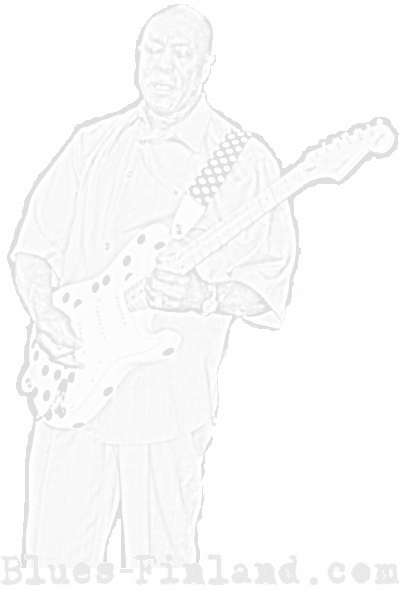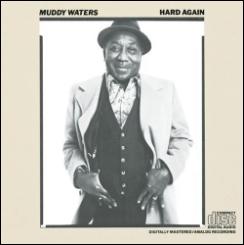 |
| Ota yhteyttä: admin (a) blues-finland.com © 2008 Blues-Finland.com |
| Muddy Waters, Part 3: Champagne & Reefer Read also Part 1 and Part 2 The success at Newport had come on Muddy's own musical terms, but Chess kept experimenting; one of their more successful ideas had Muddy overdubbing Dixon's lyrics on two Earl Hooker instrumentals, producing "You Shook Me" and "You Need Love" that by the end of the decade would both feature strongly in the repertoire of British rock acts such as the Jeff Beck Group and Led Zeppelin. In an attempt to pitch Muddy as a folk singer for the coffeehouse circuit, Chess had released "Muddy Waters Sings Big Bill Broonzy" upon Broonzy's death in 1958; the next step in that direction came with "Folk Singer", an acoustic album recorded in September 1963 with Buddy Guy on guitar, Dixon on bass, and Clifton James on drums. |
| Eager to please the crowds that had disliked his electric shows, Muddy travelled to Europe for the second American Folk Blues Festival tour with an acoustic guitar, only to find the crowds disappointed again: the British Blues Boom was on its way, and electricity was in. In 1965, Muddy Waters jammed with Dizzy Gillespie at Newport; 1966 saw him trying his hand as a disc jockey at WOPA, while Chess was busy producing the "Brass & the Blues" LP in an attempt to sell Muddy to B.B. King fans. Electric Mud In December 1966, the legendary Lomax recordings came out on Testament as "Down On Stovall's Plantation" - Muddy had wanted them released, but Leonard Chess had no interest in the material. Instead, he had Muddy cut the "Super Blues" album with Bo Diddley and Little Walter, and "Super Super Blues" with Diddley and the Wolf. And in 1968, Marshall Chess produced the notoriously psychedelic "Electric Mud" LP. "I was shooting for the hippies with that," admitted Muddy upon the release of the record that featured his vocals on top of music provided by Marshall's choice of avant-garde jazz musicians. Years later, he would add: "That one was dogshit." Panned by the critics, "Electric Mud" was nevertheless the first Muddy Waters album to reach the Billboard charts, and remains one of his most influential LP's today, although not necessarily in the blues circles. Adding Muddy's guitar, Spann's piano, and Paul Oscher's harmonica to the mix, its follow-up "After the Rain" was less psychedelic, but also less successful in bridging the gap between the blues and avant-garde musicians involved. However, the 1969 double album "Fathers and Sons" was a vast improvement: while still attempting to unite Muddy and Spann with hip young musicians, this project used blues musicians like Mike Bloomfield and Paul Butterfield for a change. Gigs were plentiful, and the money on the road - 3500 dollars for an hour's set - was getting better. Sad Sad Day And then Leonard Chess sold Chess Records to the General Recorded Tape Corporation, had a heart attack behind the wheel of his car and died on October 16, 1969. Marshall Chess became the new head of Chess Records on GRT, the doctors made Muddy switch from hard liquor to Piper-Heidsieck champagne to keep his blood pressure in check, and after 17 years in the band, Otis Spann quit, to be replaced by Joe Willie "Pinetop" Perkins. Driving home from a Saturday night gig in Tennessee, Muddy's car was hit head-on by another vehicle coming from the opposite direction. Muddy's driver died in the crash, he himself broke three ribs and his pelvis, shattered his hip, and sprained his back. He got out of the hospital two months later in January 1970, walking with a cane, his hands too swollen and numb to play the guitar. Next, Marshall Chess left the company to run Rolling Stones Records, the Chess headquarters were moved to New York, and on April 24th, Otis Spann died of liver cancer. With his own health improving, Muddy toured Europe again, but never got paid for his shows in England. He fired his manager and took over booking himself - until he met and hired Scott Cameron. "Asking do I want to book Muddy Waters was like asking a chocoholic if he wants a Hershey bar," said Cameron. "And much to the chagrin of the blues freaks, instead of playing the forty-, fifty-, sixty-seat local clubs, I began putting him in the showcase room where the rock and roll bands were playing, getting him in front of the people that were buying records." Hard Again A show at Mr. Kelly's, an upmarket Chicago night club, was recorded and released, signalling both Muddy's return to form and the completion of his transfer to white audiences. In December 1971, he took harpist Carey Bell and guitarist Sammy Lawhorn to England to record "The London Muddy Waters Sessions" that featured Rory Gallagher, Mitch Mitchell, and Georgie Fame. Soon after, he won his first Grammy for "They Call Me Muddy Waters", an album of old, but previously unreleased recordings. Another Grammy followed for the "London Sessions", and yet another one for his last LP on Chess: "The Muddy Waters Woodstock Album", recorded in 1975 with his new guitarist Bob Margolin, Pinetop, Butterfield, and Levon Helm and Garth Hudson of The Band. Muddy's long-time wife Geneva died of cancer on March 15th, 1973. A devastated Muddy was taken to a doctor and told to quit smoking, which he did. Gaining custody of some of his "outside kids", he moved them into his home, eventually buying a new house in the suburban, all-white Westmont. Another teenage daughter turned up while on tour in New Orleans; Big Bill Morganfield was introduced to his Dad after a Muddy Waters gig in Florida. Florida was also where Muddy met his future wife, the 19-year-old Marva Jean Brooks he nicknamed "Sunshine". After parting with Chess, Cameron had Muddy sign with Epic, and a recording session was set up for October 1976, with Margolin, Pinetop, Cotton, drummer Willie "Big Eyes" Smith, and producer/guitarist Johnny Winter, who happily noted that "everything the normal studio engineer tries to make sure doesn't happen, I tried to make sure that it did!" Muddy never touched his guitar during the sessions, but the resulting music was nevertheless hot enough to make him exclaim: "This stuff is so good, it makes my pee pee hard again!", lending the album its title. King Bee There was a Grammy in store for "Hard Again", a Grammy for his next studio album "I'm Ready", which reunited Muddy with Jimmy Rogers and Big Walter Horton, and a Grammy for the superb live set "Muddy "Mississippi" Waters Live". Muddy was touring all over Europe and making good money, with Piper-Heidsieck or at least Dom Perignon now part of his rider - should the promoters fail to provide the required drink, he always had some with him he was willing to sell, thus enabling the venue to abide by the contract. His band, however, did not share in his rewards, forced to stay on the road as The Legendary Band to make ends meet even when Muddy could afford a break from touring. The sessions for "King Bee" were tense, and when Cameron refused the band a raise before a Japanese tour, Muddy found himself fronting a new band, which briefly did include his old pal Jimmy Rogers. Towards the end of 1981, Muddy was diagnosed with lung cancer; part of his lung was removed, he underwent radiation treatment, but forsook chemotherapy. His illness was kept a secret, and towards summer 1982, a new tour was booked. To everyone's surprise, Muddy appeared onstage at an Eric Clapton show in Miami on June 30th, 1982 to sing "Blow Wind Blow" - Clapton's manager had arranged the visit without telling Clapton. But as he arrived back from the show, Muddy was coughing blood; the cancer had returned, and his body was not strong enough for another operation. Preferring his home to a hospital, McKinley Morganfield died there of heart failure on April 30th, 1983. ANDRES ROOTS - - - - - The three-part Muddy Waters biography started with the episodes "Mississippi" and "Chicago". In a poll arranged in the autumn of 2007, the readers of Blues-Finland.com voted Muddy the favourite blues artist of all time. |
 |
